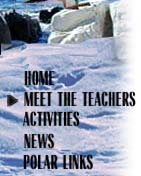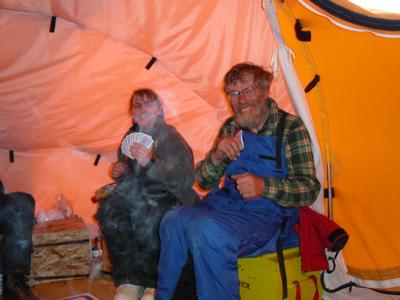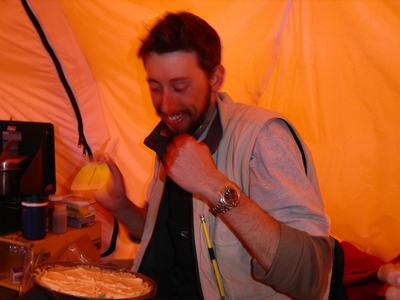
|
|
20 January, 2003
Toto, We're Not In Kansas Anymore
Last night was unbelievable. The winds were absolutely crazy. I'm sure the
gusts exceeded 40 knots. You could hear the sand hit the tent as the wind
lifted it up and threw it about the valley. We had finished our move from
the east lobe of Lake Bonney well after midnight, and had headed for the
cook tent for hot drinks. We didn't get to bed until about 2:00 am. I was
still wide awake when I went to bed, but thought I would be able to settle
down once inside my bag. The winds made sure that comfort and security
would be in question and a sound sleep would be impossible.
The reality, I'm sure, is that what we experienced was nothing much at all.
According to Brenda and Chris, these tents can withstand winds in excess of
120 mph. They are designed so that they actually get pressed towards the
ground as wind speeds increase and if they fail, it is due to the fabric
giving way, not because they blow away. Well that's all well and good, IF
you have experienced hurricane winds in one of these tents. To them, 40
knots (48 plus mph) seems mild I'm sure. However, for all of us first
timers... we were up most the night. The next morning, without any
discussion, you would see someone discreetly adding more rocks to their tent
flaps. Brenda said if the winds picked up more, we would prepare by burying
all the exposed flaps in sand so that no wind could get under to lift the
tent. Still, when your tent door is being sucked out and blown in all night
long, when the canvas wall is knocking on your head continually, and when
all you hear in an ungodly howl from the wind, you tend to stay alert!
Note: We heard a report that the winds last night reached 110-120 knots out
at Cape Royds. One of the tents there was shredded, but the inner lining
remained intact. The strong ultraviolet light here can really discolor a
tent and damage the fabric. Happy to report, all members of the party were
safe and unharmed.
We eventually all converged in the cook tent around 9:30 am. There was no
rush as everyone had gone to bed late and it was too windy to work outside.
We had a leisurely breakfast and hung out until the winds eased up around
noon. Then we headed out to the ice. We drilled one hole with the jiffy
auger and cored one hole. The coring went relatively quickly because we
cored it remotely, meaning we just lowered the core barrel and hammer on a
wire and rope, and did not add all the extension poles.
We managed to pull up about a 24 inch core sample. By the time the core
barrel was lifted and being transferred onto the PVC pipe, it was again very
cold and windy. Jake took measurements and documented his observations. We
all stayed close, huddling to keep warm and to block the wind as the core
was being wrapped for travel. Chris pulled out a tarp that we used to help
create a wind barrier.
Once the core sample was packaged, we took the long walk across the ice back
to the camp. The walk is a much easier one than we experienced back at Lake
Fryxell. We met in the cook tent for hot drinks, an afternoon snack, and to
warm up. It was about 4:00. Soon after, a few of us, myself included,
headed to our tents for a nap. Something we hadn't done since arriving in
Antarctica, but it was too windy to go back out on the ice and since most of
us didn't sleep much last night, it was a much-needed rest. At least we had
managed to get some work in for the day.
I wrote for a while and then slept until dinner at 7:30, after which some of
our team played a card game that had them roaring with laughter. It was
funny just watching them. I continued to sip hot chocolate and journal
while I enjoyed their laughter. Most everyone retired at around 10:30. In
what seems to have now become our routine, the "night owls", Tom and I,
stayed up until 12:30 writing and chatting.

Tent time: Sarah, Sean, Aaron, and Chris (pumping the stove as usual).

Brend and Chris playing cards and sharing a laugh.

Tom cutting up his cheese cake creation.
Contact the TEA in the field at
.
If you cannot connect through your browser, copy the
TEA's e-mail address in the "To:" line of
your favorite e-mail package.
|
